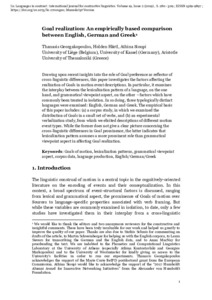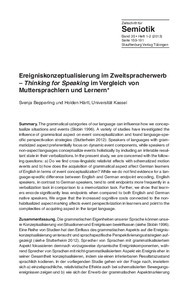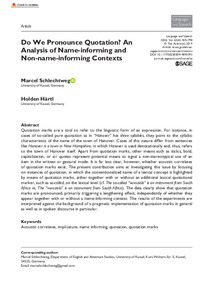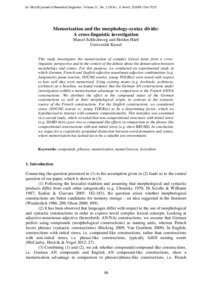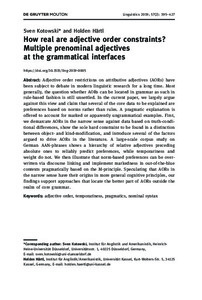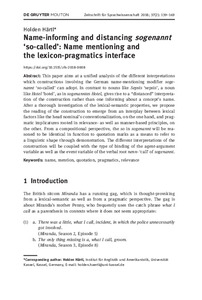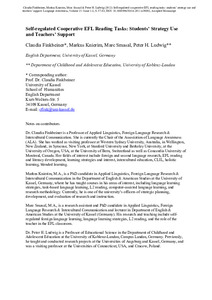Suche
Anzeige der Dokumente 1-7 von 7
Aufsatz
 Goal realization: An empirically based comparison between English, German and Greek
Goal realization: An empirically based comparison between English, German and Greek
(2018)
Drawing upon recent insights into the role of Goal preference as reflector of cross-linguistic differences, this paper investigates the factors affecting the realization of Goals in motion event descriptions. In particular, it examines the interplay between the lexicalization pattern of a language, on the one hand, and grammatical viewpoint aspect, on the other – factors which have commonly been treated in isolation. In so doing, three typologically distinct languages were examined: English, German and Greek. The ...
Aufsatz
 Ereigniskonzeptualisierung im Zweitspracherwerb - Thinking for Speaking im Vergleich von Muttersprachlern und Lernern
Ereigniskonzeptualisierung im Zweitspracherwerb - Thinking for Speaking im Vergleich von Muttersprachlern und Lernern
(2013)
The grammatical categories of our language can influence how we concep-tualize situations and events (Slobin 1996). A variety of studies have investigated the influence of grammatical aspect on event conceptualization and found language-specific perspectivation strategies (Stutterheim 2012): Speakers of languages with grammaticized aspect preferentially focus on dynamic event components, while speakers of non-aspect languages conceptualize events holistically by including an inferable resultant state in their ...
Aufsatz
 Do We Pronounce Quotation? An Analysis of Name-informing and Non-name-informing Contexts
Do We Pronounce Quotation? An Analysis of Name-informing and Non-name-informing Contexts
(2019-12-23)
Quotation marks are a tool to refer to the linguistic form of an expression. For instance, in cases of so-called pure quotation as in “Hanover” has three syllables, they point to the syllabic characteristics of the name of the town of Hanover. Cases of this nature differ from sentences like Hanover is a town in New Hampshire, in which Hanover is used denotationally and, thus, refers to the town of Hanover itself. Apart from quotation marks, other means such as italics, bold, capitalization, or air quotes represent ...
Aufsatz
 Memorization and the morphology-syntax divide: A cross-linguistic investigation
Memorization and the morphology-syntax divide: A cross-linguistic investigation
(2016)
This study investigates the memorization of complex lexical items from a cross-linguistic perspective and in the context of the debate about the demarcation between morphology and syntax. For this purpose, we conducted an experimental study in which German, French and English adjective-noun/noun-adjective combinations (e.g. Jungtourist, jeune touriste, YOUNG tourist, young TOURist) were tested with respectto how well they were memorized. Using existing nouns (e.g. Architekt, architecte, architect) as a baseline, we ...
Aufsatz
 How real are adjective order constraints? Multiple prenominal adjectives at the grammatical interfaces
How real are adjective order constraints? Multiple prenominal adjectives at the grammatical interfaces
(2019)
Adjective order restrictions on attributive adjectives (AORs) have been subject to debate in modern linguistic research for a long time. Most generally, the question whether AORs can be located in grammar as such in rule-based fashion is still unsettled. In the current paper, we largely argue against this view and claim that several of the core data to be explained are preferences based on norms rather than rules. A pragmatic explanation is offered to account for marked or apparently ungrammatical examples. First, ...
Aufsatz

 Name-informing and distancing sogenannt ‘so-called’: Name mentioning and the lexicon-pragmatics interface
Name-informing and distancing sogenannt ‘so-called’: Name mentioning and the lexicon-pragmatics interface
(2018)
This paper aims at a unified analysis of the different interpretations which constructions involving the German name-mentioning modifier soge-nannt‘so-called’ can adopt. In contrast to nouns like Sepsis‘sepsis’, a noun like Hotel ‘hotel’, as insogenanntes Hotel, gives rise to a “distanced” interpretation of the construction rather than one informing about a concept’s name. After a thorough investigation of the lexical-semantic properties, we propose the reading of the construction to emerge from an interplay between ...
Aufsatz

 Self-regulated Cooperative EFL Reading Tasks: Students’ Strategy Use and Teachers’ Support
Self-regulated Cooperative EFL Reading Tasks: Students’ Strategy Use and Teachers’ Support
(2012-04-11)
The ADEQUA research project has gained empirical evidence on how the situationally adequate use of learning strategies can be facilitated during cooperative reading tasks in the EFL classroom. Two video studies were conducted with 9th grade EFL (English as a Foreign Language) learners in German schools: The first (laboratory) study investigated the students’ use of strategies while working in dyads and without teacher support on a given task. The second study, a field study, focused on teachers’ actions to support ...

